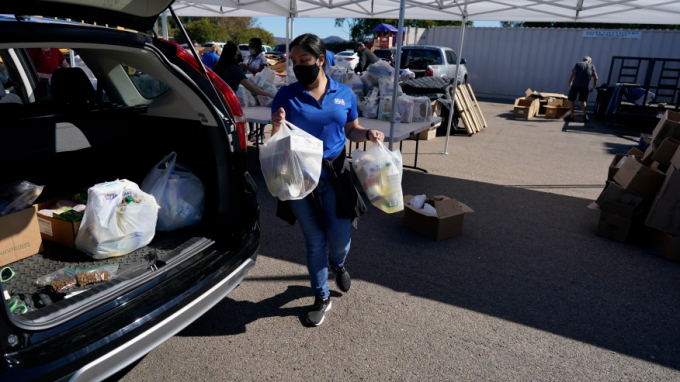November 28, 2025 | 04:03 GMT +7
November 28, 2025 | 04:03 GMT +7
Hotline: 0913.378.918
November 28, 2025 | 04:03 GMT +7
Hotline: 0913.378.918

A volunteer loads food into a car at an Armed Services YMCA food distribution, Oct. 28, 2021, in San Diego. As many of 160,000 active duty military members are having trouble feeding their families, according to Feeding America, which coordinates the work of more than 200 food banks around the country. Photo: AP
Without, that is, bothering to get congressional approval of either the programs or the expenditures.
The scheme starts with the Commodity Credit Corporation. A funding mechanism for federal agricultural programs, the CCC has been around for nearly 90 years. In simple terms, it can spend up to $30 billion a year on agricultural programs. Much of this money is reserved for funding price-support programs and other initiatives authorized through farm bills. But Section 5 of the Commodity Credit Corporation Charter Act gives the agriculture secretary significant discretion to spend nondesignated money on a whim.
In general, this discretionary spending power hasn’t been used to any significant extent. From 2012 to 2017, Congress even expressly limited the agriculture secretary’s ability to use this discretionary spending authority. This all changed in 2018 and 2019 when the Department of Agriculture, through the CCC, gave $28 billion of trade aid to farmers. That took the use of the discretionary power under the CCC to a whole new level and, in so doing, set a terrible precedent .
This brings us to where we are now. The Biden administration is trying to use this broad discretionary power to push its climate change agenda.
It’s trying to get around Congress to create a new program out of whole cloth, what it calls the Climate-Smart Agriculture and Forestry Program . While the details of this program are sketchy, it’s basically a way to push certain agricultural practices onto farmers to achieve the administration’s climate goals. But the administration has a problem. While Section 5 of the Charter Act gives the agriculture secretary a great deal of discretionary spending power, it doesn’t permit the CCC to create this program.
The Charter Act clearly states that the CCC can use its powers only to "[c]arry out conservation or environmental programs authorized by law" (emphasis added). And the administration’s proposed climate change program hasn’t been authorized by law.
In a recent notice seeking comments on the program, the CCC doesn’t even try to say it has authority to create the program through the actual environmental provision in the Charter Act. In fact, it doesn’t even mention the environmental provision, likely because it knows mentioning it would be fatal to the effort. Instead, it claims that it can create the program because there’s a provision in the statute about helping to market commodities.
According to the CCC, it would be helping to market "climate-smart commodities." Of course, these are just existing commodities that would be produced according to the ideologically preferred agricultural practices of the Biden administration.
To get around the plain language of the Charter Act, the administration is effectively saying that it can create an unauthorized environmental program so long as it can claim an environmental program will somehow help market commodities. Despite all of Biden's legal gymnastics, however, the program is still an environmental program. And the only way to claim authority for this program or any other unauthorized climate program is to pretend the environmental provision in the Charter Act doesn’t exist.
So, what needs to be done?
Up until recently, Congress passed policy riders through appropriations bills to make sure the agriculture secretary didn’t abuse this discretionary power and create a slush fund. Congress properly recognized that it shouldn’t abrogate its spending power and allow an administration to use the CCC as a slush fund to advance its agenda unilaterally.
Congress needs to go back to those practices. That would keep the administration from operating an unauthorized climate change slush fund. More importantly, it would ensure that legislators, not the agriculture secretary, are the ones deciding how to spend billions of taxpayer dollars every year.
(Washingtonexaminer)

(VAN) A new study reveals how the simultaneous effects of ocean acidification, salinity and loss of oxygen are making the world more fragile.

(VAN) Hopes are growing that the creation of the first 3D turkey gut model could be a turning point in the battle against the virulent blackhead disease.

(VAN) Tyson, America’s biggest meat supplier, plans to shutter one of its largest beef processing plants as the industry continues to struggle with low cattle supplies and political pressure from Washington.

(VAN) New FAO study shows how digital solutions are empowering farmers and fishers to prevent losses and build resilient agrifood systems.

(VAN) Brazil's COP30 presidency pushed through a compromise climate deal on Saturday that would boost finance for poor nations coping with global warming but that omitted any mention of the fossil fuels driving it.

(VAN) Poultry farmers in the UK have been warned that they could face one of the worst winters yet for bird flu.

(VAN) Prices of main-crop paddy have risen sharply, with jasmine rice hitting 16,100 baht per tonne — the highest level in years.